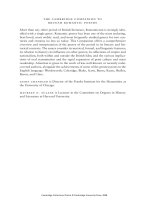The cambridge companion to british roman 27
Bạn đang xem bản rút gọn của tài liệu. Xem và tải ngay bản đầy đủ của tài liệu tại đây (38.23 KB, 1 trang )
Introduction
“Britain” but also resisted her hegemony, carving out poetic territories in
“Scottish ballads,” “Irish melodies,” “Welsh airs.”
And further, the discovery of a long and deep history of “English” verse
in the mid-eighteenth century (thanks to the efforts of Thomas Percy and
Thomas Warton, among others) had enormous implications for the diversifying of Romantic versification; so too the excavation of other national poetic
pasts (e.g., Macpherson’s Ossian, Jones’s Welsh bards, Irish antiquarians’
even more vexed efforts) complicates our sense of what a British Romanticism in verse might be (as in the vexed case of Burns, or “dialect” poetry
as a category). In addition to, or entwined with, a poetry-of-consciousness,
of reflexive subjectivity, Romantic poetry emerges as a project of cultural
inquiry, national fantasy, and sociopolitical critique as much as a poetry of
self and nature: ethnopoetics meets psychology in this period in ways that
still shape our own.
It is fair to say that, had this Companion been published a decade ago,
in the late 1990s, the claims for the distinctiveness of a Companion on
“Romantic Poetry” (much less a “British Romantic Poetry”) would perhaps
have been less evident. But over the course of the last decade – after the
challenges from various quarters, after the expansion of the canon for this
period, after efforts to displace “poetry” from its long-standing centrality
to Romanticism, after some renewed questioning of the very concept of
Romanticism itself – there have been a number of efforts to return to poetry
and poetics in the period. These efforts have gone by various names: the new
formalism, Adorno, the Frankfurt School, the new poetics. And they are still
in some cases incipient gestures. Nonetheless, they suggest something on the
horizon that, though not yet quite distinct, may move us in a new direction
over the coming decades. What that direction might be is not easy to say, but,
as a very rough stab at the problem, we speculate that poetry may reassert
itself within Romanticism in either of two ways: either as a principle of
indeterminate form or in multiple relation to other domains. We may think
of this as the difference between “poetry as . . .” and “poetry and . . .”
Such a distinction perhaps informs Wordsworth’s twofold wish in the
sestet of the famous sonnet that celebrated its bicentennial in 2007: “The
World is Too Much With Us”:
Great God! I’d rather be
A Pagan suckled in a creed outworn;
So might I, standing on this pleasant lea,
Have glimpses that would make me less forlorn;
Have sight of Proteus rising from the sea;
Or hear old Triton blow his wreathed horn.
5
Cambridge Collections Online © Cambridge University Press, 2008









